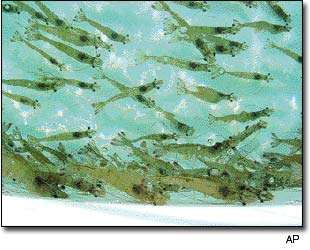WAIMANALO, HAWAII — The Oceanic Institute (OI) recently provided a new line of Pacific white shrimp broodstock for testing to Ceatech, USA, Inc., where offspring have been produced for on-farm growth evaluation trials.
The collaboration between OI, a not-for-profit research facility located on O‘ahu, and Ceatech, a commercial shrimp farm located on Kaua‘i, will evaluate the performance of these shrimp under commercial conditions for the future benefit of shrimp farmers in Hawai‘i and across the United States.
“The collaboration complements our in-house breeding research and could enhance economic sustainability of this farming operation,” said Paul Bienfang Sr., Ph.D., Vice-President of Ceatech USA, Inc. Several of Ceatech’s technical staff conducted shrimp research at OI prior to establishing their farm on Kaua‘i in 1997.
Scientists at OI and Ceatech breed specific-pathogen-free (SPF) shrimp, which are shrimp that have been tested throughout their life and found to be free from nine critical viral pathogens that are harmful to shrimp.
Using artificial insemination, scientists employ family selection to develop lines of SPF shrimp for varying traits that yield higher production under different culture conditions.
The Institute developed the technology for producing SPF shrimp and created the first major population of disease-free shrimp in the world. OI also selectively breeds the SPF shrimp for important on-farm characteristics and provides them to industry in the U.S. from time to time.
George Chamberlain, Ph.D., President of the Global Aquaculture Alliance, recently stated, “The development of SPF shrimp by The Oceanic Institute is probably the most significant technological contribution that has been made to the shrimp industry.”
“In these current trials we are evaluating shrimp from our new selectively bred stock at two commercial shrimp farms, one in southern Texas and one in Hawai‘i,” said Shaun M. Moss, Ph.D., Director of Shrimp Technology for The Oceanic Institute.
“The objective is to determine how well this shrimp line performs under commercial growout conditions in these two different production environments.”
Ceatech employs an intensive shrimp farming technology that makes use of lined round ponds to grow shrimp, whereas the farm in Texas uses traditional, coastal earthen ponds and less intensive production rates.
The shrimp under evaluation were bred to perform well in super-intensive production systems, and the evaluation will determine how well suited they are for production under these two conditions. Successful performance results could be very beneficial to improving economics on the farms.
“The project is an example of cooperation in Hawai‘i between a research institution and a commercial entity to advance the development of shrimp farming in Hawai‘i and the U.S.,” added Dr. Moss.
Research on marine shrimp at The Oceanic Institute is funded in large part by the U.S. Department of Agriculture through the U.S. Marine Shrimp Farming Program, whose goal is to expand the nation’s shrimp farming industry, reduce the $3.2 billion trade deficit from imported shrimp, and reduce U.S. dependency on foreign products.
Ceatech USA, Inc. is a shrimp aquaculture company that uses advanced biotechnological methods for breeding, growing, and processing premium-quality shrimp.
Ceatech’s innovative farming system produces very high yields of distinctively high-quality table shrimp that are marketed in Hawai‘i and the U.S. mainland under the name “Kauai Shrimp.”
The Oceanic Institute, located in Hawai‘i, was founded in 1960.
The Institute is a not-for-profit, applied research organization dedicated to the development of technology and applications in aquaculture, environmental science, and marine biotechnology. The Oceanic Institute is affiliated with Hawai‘i Pacific University.





